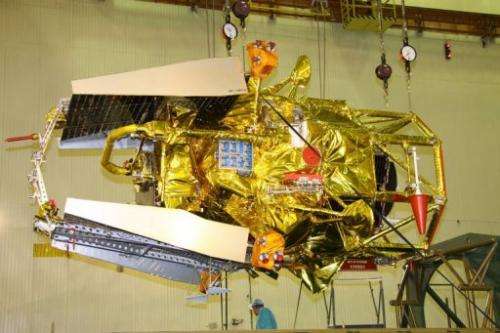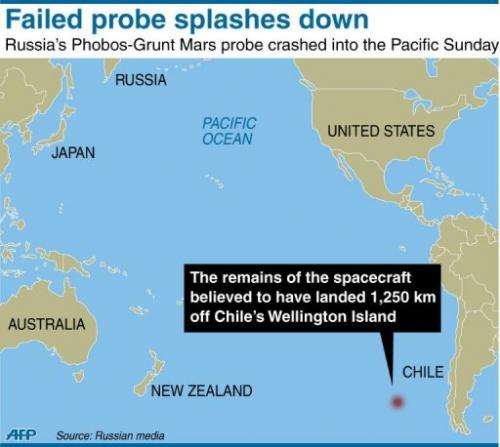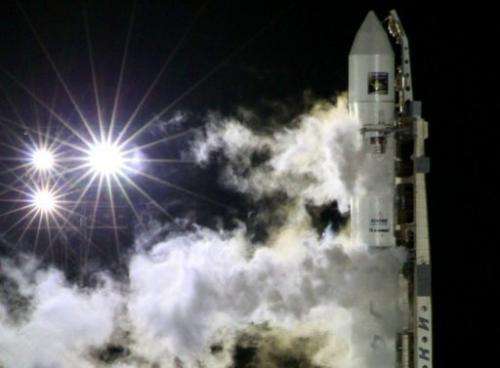Russian Mars probe meets inglorious end in Pacific

Russia vowed Monday to expose the officials responsible for the failure of a Mars probe that the military said crashed into the Pacific Ocean after orbiting the Earth for more than two months.
The 13.5-tonne Phobos-Grunt probe re-entered the Earth's atmosphere late Sunday and was thought to have mostly burned up in an ignominious end to an ill-fated bid to relaunch Russia's interplanetary programme.
It had blasted off November 9 on an ambitious mission to collect soil samples from Mars' largest moon Phobos. But its booster rockets never triggered and the probe lost contact with ground control and spiralled into an uncontrolled descent.
"I'm taking personal control of the investigation into the reasons for the Phobos-Grunt accident," Russia's former ambassador to NATO and recently appointed Deputy Prime Minister Dmitry Rogozin wrote on his Twitter account.
Rogozin said he expected the Russian space agency Roscosmos to name the "anti-heroes" responsible for the latest in a series of space failures.
"I am expecting Roscosmos' promised report on the reasons for the accidents, the names of the anti-heroes and also its view on the prospects for developing the space sector up to 2030," he wrote.
He added he would attend a meeting with constructors on January 31.
Russia's military space forces said fragments of the probe were believed to have crashed Sunday into the Pacific Ocean, although there were no reports that its impact had been observed.

Space forces spokesman Alexei Zolotukhin told Russian news agencies that the impact site was some 1,250 kilometres (800 miles) west of the island of Wellington off the coast of Chile.
After remaining silent on the probe's fate until Monday afternoon, Roscosmos said in a brief statement that the probe "had ceased its existence" in a section covering "the southern part of the Pacific Ocean, South America and the Atlantic Ocean."
Roscosmos had predicted 20 or 30 segments weighing no more than 200 kilogrammes (440 pounds) in total would survive the explosive re-entry and actually hit the Earth's surface.
It remained unclear how much of the probe burned up in the atmosphere and whether any fragments landed on Earth.
"It could have broken into tiny pieces after an explosion with none of them reaching Earth, or if they reached Earth, they could have spread over a huge area," said Igor Marinin, editor-in-chief of Space News magazine.

The unmanned $165 million vessel is one of the largest objects to re-enter the atmosphere since Russia brought down the Soviet-era Mir space station in 2001.
Sky gazers reported the gold-coloured vessel emitting a bright orange glow as it circled the globe in an eastward direction between London to the north and New Zealand to the south.
The craft was loaded with 11,000 tonnes of toxic fuel -- enough to take it to Phobos -- as well as a Chinese satellite it had been due to put in orbit around Mars under a landmark deal with Beijing.
The probe's fatal end provides a bitter reminder for Russia of the prowess it has lost in the half-century since Yuri Gagarin's historic first space flight in 1961.
"Five and half billion rubles and all the hopes of Russian space science for a revival... today burn up without any glory in the earth's atmosphere," space expert Vadim Lukashevich wrote on the website of the Echo of Moscow radio.
"Russian cosmonautics de facto no longer exists. All that exists is the remains of the Soviet system."
The accident is one of the more high-profile mishaps in a year littered with unprecedented setbacks for the once-vaunted Russian space programme.
It struck less than three months after an unmanned Progress supply ship bound for the International Space Station crashed into Siberia.
Russia also lost three navigation satellites as well as an advanced military satellite and a telecommunications satellite in the past year.
(c) 2012 AFP




















